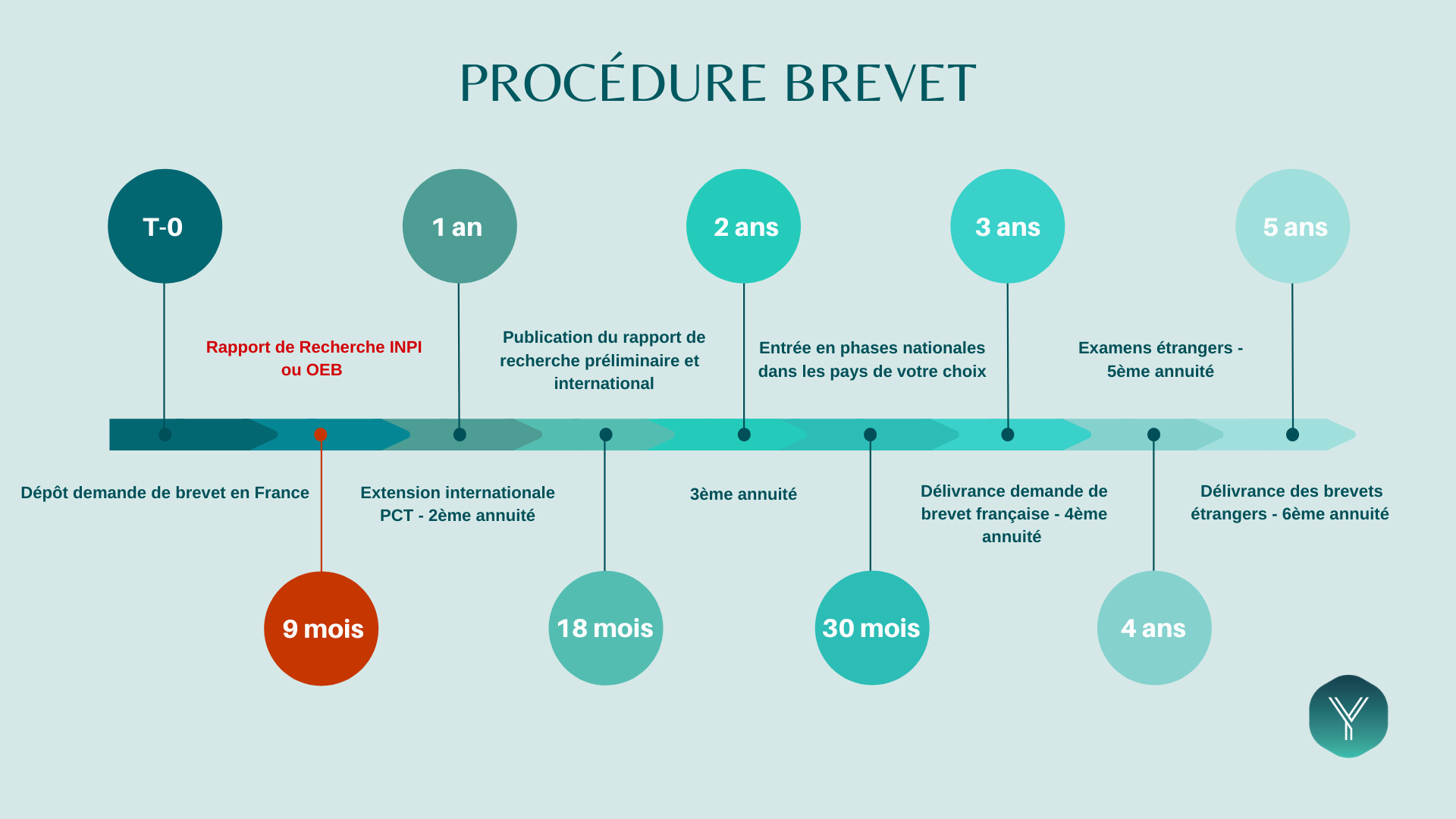A patent confers a 20-year monopoly on the exploitation of an invention. Many companies, start-ups and independent inventors wish to obtain a patent. But it takes a long time for a patent to be granted. In France, the procedure takes a minimum of 27 months. The filing of a patent application should not be confused with the granting of the application. In the case of a French application, it takes almost 3 years.
During this procedure, the preliminary search report issued by INPI is of paramount importance.
What are the stages from application to issue?

From the filing of the patent application, it generally takes 9 months before INPI receives the Preliminary Search Report and the Examiner’s Written Opinion.
The preliminary research report and the Examiner’s written opinion

The INPI’s preliminary search report is a document listing the prior art documents raised by the Examiner against the patent application.
There are several categories of documents, classified according to their relevance to your invention:
- X: Relevant in terms of novelty
- Y : Relevant in combination with another inventive step document
- A: Technological background
The search report will therefore cite documents, marked according to their relevance to the novelty and inventiveness of the invention presented.
If a cited document is X or Y, then the answer is mandatory. This is the case for 95% of research reports.
The report is accompanied by the Examiner’s Written Opinion, which details, by claim, what he considers to be new and/or inventive in the proposed claims, by comparing them with the prior art documents he has identified.
This report is similar to a patentability study with prior art search that an industrial property firm can carry out before filing a patent application, to help you in your decision whether or not to file an application. The difference is that the Preliminary Search Report is an official document issued by the national Office.
The INPI’s Preliminary Search Report is actually “subcontracted” to the European Patent Office (EPO). The EPO is considered one of the most demanding offices in the world. A positive INPI search report is generally a guarantee of a future grant in France and Europe at the very least.
What are the benefits of a preliminary research report?
The research report gives an idea of :
- novelty,
- inventiveness,
- clarity,
- sufficiency of description
- industrial application of the invention
The preliminary search report enables you to assess the chances of your patent application being granted.
✅it provides official information about the documents considered closest to the prior art by the Examiner. This enables you to modify your invention accordingly and, if necessary, refocus the scope of protection of the claims as filed. [DLRC1]
Discover 👉 Freedom to operate
✅ This Search Report also enables you to decide whether or not to internationalize your patent application, 12 months after filing, in order to virtually protect your application in all 155 PCT contracting countries.
Read more 👉 Quick guide to internationalization
To read 👉 INPI grants
My preliminary research report looks bad. What should I do?

Your search report looks bad, it only has X documents, don’t panic!
✅ Industrial property attorneys generally draft the broadest possible claim 1 in order to obtain the widest possible scope of protection for your invention. In 95% of cases, this claim is considered neither new nor inventive by the Examiner. But that’s precisely the job of a patent attorney, who will gradually trim the scope of the invention, to find the right compromise and have claim 1 issued as broadly as possible.
✅ Your patent attorney will be able to defend your application by responding to the Preliminary Search Report. He will be able to argue with the Examiner about the objections raised by the latter in his report, and in particular :
- indicate that the scope of the claims as filed does not fall within the scope of the documents identified by the Examiner;
- that the invention adds something to what already exists;
- propose a new set of claims, amended if necessary to take account of the examiner’s objections.[DLRC2]
✅ If the preliminary search report is really not good, then the patent attorney may suggest :
- attempt to argue the objections raised by filing a response with the Examiner; or
- withdraw the application before publication, so that it can remain secret if you haven’t disclosed it. This will allow you to modify the application if necessary, to improve your invention before attempting to re-file. Maybe the second time will be the charm!
The preliminary search report in France is therefore generally the first official feedback the INPI gives on your invention. If you don’t know how to analyze it, or how to respond to it, don’t hesitate to contact the YesMyPatent team. Our team of 20 patent attorneys is specialized in a wide range of technical fields, and will be able to help you draft this response, and guide you through the rest of the procedure for granting your application.
[DLRC1]Not necessarily patents, but documents contained in scientific literature.
[DLRC2]No, it’s the dependent claims that were drafted at the time of filing that contain the features that allow us to repatriate them in the independent claim if need be, because it’s the claims that delimit the scope of protection of the application.
